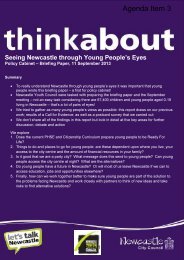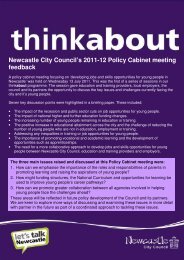NEWCASTLE'S MUSICAL HERITAGE AN INTRODUCTION By ...
NEWCASTLE'S MUSICAL HERITAGE AN INTRODUCTION By ...
NEWCASTLE'S MUSICAL HERITAGE AN INTRODUCTION By ...
Create successful ePaper yourself
Turn your PDF publications into a flip-book with our unique Google optimized e-Paper software.
although I can find no evidence that he performed in Newcastle. However, his<br />
influence together with that of his French equivalent, Philippe Musard (1793-<br />
1859) who introduced Promenade concerts into Paris in 1833 and Louis Antoine<br />
Jullien, must have been instrumental in the introduction of Promenade Concerts<br />
in general. Jullien and his orchestra did perform in Newcastle in January 1857 at<br />
the Theatre Royal, Grey Street, billed as ‘Mon. Jullien and his Unrivalled Band’.<br />
Jullien was a sort of 19 th century pop idol. He had about two dozen Christian<br />
names having been named after all the members of the local philharmonic<br />
orchestra in his hometown of Sisteron. He introduced the Polka to England and<br />
Queen Victoria was not amused, but she should have been flattered in 1845<br />
when Jullien and an orchestra of five hundred played ‘her tune’ at Covent Garden<br />
with a cannon shot in each bar. Jullien made a fortune from music but died in<br />
poverty and lunacy. Notwithstanding all this, Mr Rea had some original ideas and<br />
they did not go unnoticed outside the town, as the following contemporary<br />
newspaper report testifies:<br />
‘It may be perhaps gratifying to the subscribers to learn that the Annual Series of<br />
Orchestral Concerts in Newcastle are now exciting considerable attention in<br />
musical circles in London, and that Glasgow, Edinbro’ and Greenock are<br />
beginning to avail themselves of the services of the Orchestra organised by Mr<br />
Rea, and are following in the wake of Newcastle-upon-Tyne. Mr Rea has no<br />
hesitation in affirming that better concerts than those which have been given<br />
during the last month have seldom been heard either out of or in the Metropolis.<br />
In confirmation of this he begs to refer his patrons to the list of works performed,<br />
and to remind them of the highly finished performances of such excessively<br />
complicated works as the Power of Sound (Spohr), the Scotch Symphony, the<br />
Pastoral Symphony, &c., &c.’<br />
The article concludes with a list of the orchestral works performed in the third<br />
series of these concerts which includes Beethoven symphonies 1,2,4,5 and 6,<br />
Haydn’s ‘Surprise’, Mendelssohn’s ‘Italian’, ‘Reformation’ and ‘Scotch’ and many<br />
overtures, marches, waltzes and operatic selections by other leading composers.<br />
William Rea had literally overnight, and single handedly, changed the concert<br />
scene in Newcastle.<br />
William Rea died shortly after 11 o’clock on 8 th March 1903 at his home at No<br />
7 Summerhill Grove at the top of Westgate Hill and was laid to rest in Jesmond<br />
Old Cemetery. On his death the following appeared in the Newcastle Daily<br />
Journal: -<br />
‘When William Rea came to Newcastle if could hardly be said that it was a<br />
musical town, and indeed it would be scarcely the truth to say that the arduous<br />
labours on which he entered with enthusiasm and with persistent effort met with<br />
such appreciative response they deserved. In those days it was a common<br />
matter of reproach that Newcastle cared so little for music that no high-class<br />
concert paid and consequently that accomplished artistes fought shy of the<br />
45

















